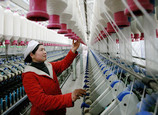
System reform
According to Yu, releasing NBS figures offers a powerful argument for the reform of income distribution. "It is time for China's income system to be adjusted."
Having established a market economy adaptive to globalization, the warning line of 0.4, based on the compensation system, income structure and social welfare in developed countries, is also applicable to China.
The NBS figures show the national Gini coefficient reached between 0.47 and 0.49 in the past 10 years. "This requires the government to acknowledge and solve the problem of income inequality," said Yu. Both governmental and independent information prove that China has indisputably exceeded the internationally accepted warning line.
Ma agrees. "The Gini coefficient reflects China's large income gap, indicating the urgency to accelerate reform," he said at the press conference on January 18.
The scheme of income distribution reform was initially drafted in 2004. Since the issue involves livelihoods as well as economic and social development, the draft remains incomplete.
The Gini coefficient is just as important as the GDP. If the latter reflects the size of the cake, the former reveals ways in which it is distributed. China's GDP has now exceeded 50 trillion yuan ($7.96 trillion). If the country cannot properly distribute wealth, the Gini coefficient will continue to rise, threatening the sustainability of China's economic development and making the country fall into the "middle income trap."
According to Ma, the government should be rational in analyzing China's income inequality and formulate a proper scheme for reform, focusing on the relationship between the market and the efficiency of development as well as wealth distribution.
Su Hainan, Deputy Director of the China Association for Labor Studies, thinks the NBS data will serve as an assessment standard to deepen the reform of income distribution and highlight the government's resolution to address inequality.
Reform must entail not only the raising of wages, but also make up for the shortfall in housing, education, healthcare and pension funds, alongside readjusting unreasonable property distribution.
Su also believes in "upping low incomes" while "controlling high earnings." The former refers to realizing full social security coverage, properly raising the minimum wage, upping salaries in labor-intensive industries and further increasing farmer incomes. Moreover, the government will offer more low-rent and affordable homes to low-income groups while helping depositors and individual stock investors enjoy reasonable interests and yields.
To "control high earnings," the government will keep tabs on the excessively high salaries associated with senior company management and monopolistic industries. On the other hand, the state will gradually change the unreasonable distribution of property proceeds. Based on such measures, China will also improve the collection of individual income tax, accelerate property tax reform and launch the estate tax at the proper time, strengthen management of the stock and real estate market as well as better manage the resource allocation system to ensure fairness.
"Only by making efforts along the above lines can the country gradually lower its Gini coefficient and realize common prosperity," Su said.
The target for reform remains unchanged—enlarge the middle class.
"As the most difficult task in China's development, progress in income distribution reform is expected," he added.

















 Most feared Spring Festival questions
Most feared Spring Festival questions


![]()
